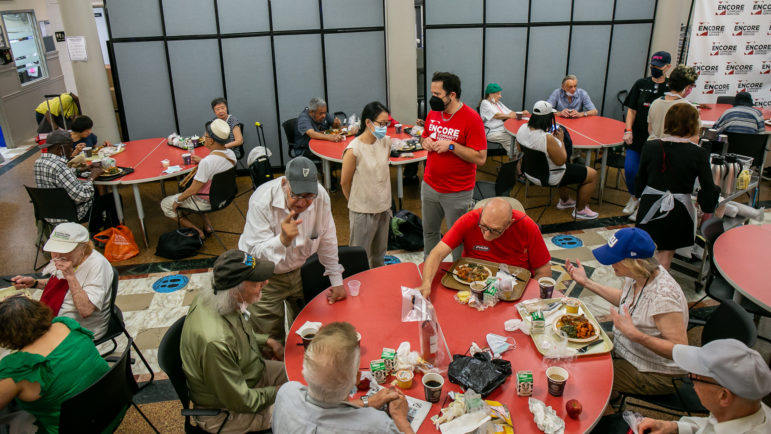-Program also to feature a “train-the-trainer” program to provide instruction on the methodology of Yiddish language instruction-
-Collaboration bucks trend of foreign language enrollments on college campuses, noting Workmen’s Circle’s tripling of enrollment in its online courses-
(New York, NY and Melrose Park, PA)— Gratz College and the Workmen’s Circle today announced a new partnership to offer college credit for online Yiddish language and culture classes starting next year. This program greatly expands opportunities for students to learn to read, speak and write in Yiddish, the language of Eastern European Jews, nearly completely exterminated by the Holocaust.
The collaboration represents a mutual desire to make formal Yiddish language instruction accessible to more college students across the United States. Under the partnership, the Workmen’s Circle will provide instruction while Gratz oversees and issues college credit for completed courses. The agreement also calls for development of a “train-the-trainer” program to teach the methodology of Yiddish language instruction.
The partnership addresses a resurgence of interest in learning the “language of the old country,” said Dr. Rosalie Guzofsky, Dean and Vice President of Academic Affairs at Gratz, which is based in Melrose Park, PA. “When I first came to Gratz, I was surprised that we had such a small program. I have always wanted to offer a more vigorous study of Yiddish.”
The Workmen’s Circle, headquartered in New York City, was formed in 1900 by Yiddish-speaking Jewish immigrants from Eastern Europe. Initially a mutual aid society, the nonprofit evolved to become an organization that powers progressive Jewish identity through cultural engagement, multi-generational learning and social activism – and has become New York’s leading center for Yiddish language instruction, and the largest provider of Yiddish language classes in the United States.
“Learning more about our Yiddish language and culture is a key to understanding and connecting to our history and heritage,” said Ann Toback, Executive Director of the Workmen’s Circle. “For over a thousand years Yiddish was the prevailing language of the Eastern European Jewish people. We have a millennium of great literature, speeches, social commentary, journalism, and arts created in Yiddish. Yiddish fluency is a key to uncovering our rich cultural and activist heritage. That’s why we deeply value our online learning option, which allows us to reach and educate Yiddishists around the globe who might be searching for this unique way to connect with their culture.”
While the Workmen’s Circle has been providing adult Yiddish language instruction for decades, program enrollment has tripled since introducing real-time online classes in 2014. Its Yiddish language program has served hundreds of language enthusiasts throughout the country and abroad in Argentina, Australia, Brazil, Canada, England, France, Germany, Holland, Hong Kong, India, Israel, Japan, Lithuania, Mexico, Peru, Poland, Russia, Spain, Sweden, Switzerland, and Ukraine. Students range in age from 15 to over 80 years old and share a passion for learning and speaking Yiddish, which they can pursue anytime, anywhere, thanks to the online learning program. This past fall, enrollment in Workmen’s Circle’s online courses and brick-and-mortar Yiddish program topped 280 – the steepest enrollment the nonprofit has witnessed in a single semester.
Courses vary in proficiency level: beginners learn the basics of conversational Yiddish, while experts explore Yiddish literature and theater. At the heart of the program are the instructors: world-renowned scholars with decades of experience teaching Yiddish language and culture.
“Language is the bridge that connects past, present, and future generations,” said Kolya Borodulin, Associate Director for Yiddish Programming at the Workmen’s Circle. “We’re working to ensure this vital piece of Jewish identity, the Yiddish language, continues to contribute to world culture for generations to come. This new partnership with Gratz will further open up the world of Yiddish to new audiences – and to college students seeking to earn credit while connecting to the past, our heritage, and our roots through Yiddish.”
Gratz College, the oldest independent and pluralistic college for Jewish studies in North America, continues to offer programs with a historic Jewish focus. Its programs, which include traditional on-campus offerings, as well as blended and fully online degrees, have attracted students from 36 states and six countries.
A recent report issued by the Modern Language Association noted that foreign language enrollments dropped by more than 9 percent from 2013 to 2016, the second largest since the MLA began tracking the information. Yiddish does not rank among the top 15 languages taught in higher education, but Gratz noted that online programs make learning languages more accessible.
Currently, Gratz has only offered Yiddish language instruction through its adult education programming, enrolling a handful of students online each semester. Dean Guzofsky, who learned Yiddish at the Workmen’s Circle as a child, had searched for ways to expand Gratz’s language courses in recent years.
“The Workmen’s Circle is a place that preserves not only Yiddish language, but also literature, culture and the history of the Jewish people,” Dean Guzofsky said. “It makes sense that Gratz would partner with the Workmen’s Circle. By promoting Yiddish, our two institutions are helping preserve a shared cultural heritage.”
Toback said the agreement is mutually beneficial because Gratz reflects the values and meaning of Jewish identity.
“Yiddish language and culture is really so much a part of Jewish identity today for all of us, especially in the United States where so many of us come from an Eastern European background,” she said. “It was the language of our grandparents, spoken in our homes, in town halls, and the marketplace. It was the language for a thousand years that some of the greatest playwrights and poets and political activists wrote and spoke. Now, thanks to this partnership with Gratz, a new generation has a greater opportunity to fall in love with Yiddish.”
About The Workmen’s Circle
The Workmen’s Circle powers progressive Jewish identity through Jewish cultural engagement, Yiddish language learning, multigenerational education, and social justice activism. For over a century we have provided this 360-degree approach to Jewish identity-building. Through contemporary cultural programs, joyful holiday celebrations, strategic social justice campaigns, vibrant Yiddish language classes, interactive educational experiences and more, we connect Jewish adults, kids and families of all affiliations with their cultural heritage, working to build a better and more beautiful world for all. Learn more at www.circle.org.
About Gratz College
Gratz College provides a pluralistic education and engages students in active study for professional growth and personal enrichment. Gratz offers graduate and undergraduate degree and certificate programs, as well as learning opportunities for adults and teens. Through productive partnerships, the College also seeks to maintain and expand its institutional and academic relationships in Philadelphia, North America and worldwide. Many of Gratz’s programs reflect the College’s historic focus on Jewish studies and education. With a broad commitment to the intellectual and professional growth of diverse constituencies, the College creates access for students everywhere to become leaders in their professions and communities. Learn more at www.gratz.edu.
###








